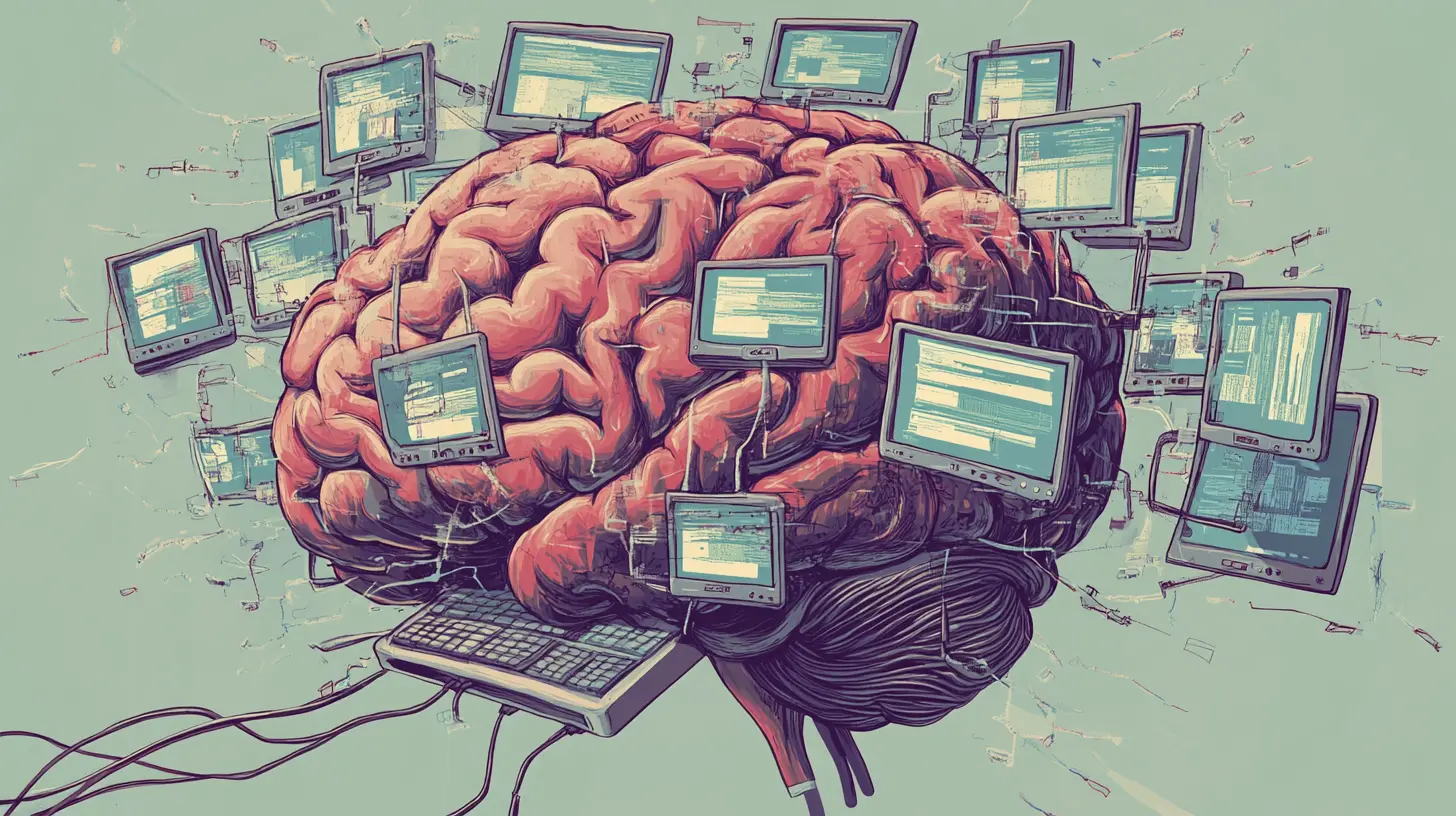Some days, it feels like your brain is a browser with 37 tabs open—half playing music, some frozen, and one randomly blasting an ad.
The world says: “Just meditate for an hour.” But what if you don’t have the time—or patience—for that?
Here’s how to reset fast—without sitting cross-legged in silence.
1. Close the Open Tabs—In Your Brain#

Overwhelm isn’t just about stress—it’s unfinished thoughts cluttering your mind.
This is called the Zeigarnik Effect—our brains fixate on incomplete tasks. The more undone things we carry in our minds, the heavier they feel.
📌 Quick Fix:
- Take 2 minutes to write down everything on your mind—tasks, worries, random thoughts.
- No need to organize—just dump them out.
- Your brain will stop looping over them once they’re on paper.
“The mind is for having ideas, not holding them.”
— David Allen, Getting Things Done
Your brain works better when it’s not hoarding unfinished thoughts.
2. Do a ‘90-Second Reset’ (How Your Brain Actually Resets Stress)#
Neuroscientist Dr. Jill Bolte Taylor discovered that an emotion (like stress or overwhelm) chemically lasts only 90 seconds in the brain.
After that? It’s just you feeding the cycle by replaying the thoughts.
📌 Quick Fix:
- When stress spikes, literally wait 90 seconds before reacting.
- Stand up, shake out tension, do a random task—anything to break the loop.
- If you still feel the same after 90 seconds, then act—but most of the time, it fades.
“Your emotions last 90 seconds. What happens after that is up to you.”
— Dr. Jill Bolte Taylor
It’s like hitting CTRL+Z on stress.
3. Move, Shock, Reset#

Your nervous system is like an overheated engine—when overwhelmed, it needs a reset.
📌 Quick Fix:
- 🚶 Walk 200 steps. No overthinking, just move—movement forces a mental reset.
- 🧊 Shock your nervous system. Run cold water on your wrists or splash your face—activates the vagus nerve, which immediately lowers anxiety.
- 🏃 Do a quick, intense movement. Jump in place, shake out your arms, do 10 squats—releases stress-holding tension.
📖 Science-Backed:
“A brief walk, cold exposure, or fast movement can immediately lower stress hormones.”
— Dr. Andrew Huberman, Stanford Neuroscientist
4. Use the 3-Item Rule (Because To-Do Lists Are Overwhelming)#
When you feel overwhelmed, it’s not just because you have too much to do—it’s because everything feels like it needs to be done right now.
But here’s the truth: most of it can wait.
📌 The Fix? Think in Threes.
Instead of drowning in endless tasks, strip your focus down to just three things at a time:
✅ 1 urgent task (What actually needs to get done today?)
✅ 1 small, easy win (Something quick that gives momentum.)
✅ 1 personal act of care (Because your well-being matters too.)
Anything beyond that? IT CAN WAIT.
“Overwhelm happens when everything feels urgent. The secret? Most things aren’t.”
Your brain sees three things as manageable—and that’s enough.
5. Reduce ‘Invisible Stressors’ (The Ones You Don’t Notice)#

Some stress isn’t about what you’re doing—it’s about what’s quietly draining you.
📌 Quick Fix:
- Put your phone on greyscale mode (makes it less addictive).
- Reduce visual clutter (even clearing your desk lowers stress).
- One silent hour rule—no background noise, no random scrolling, just mental breathing space.
“Not all stress comes from big problems—some of it sneaks in through small distractions.”
6. Use ‘Anti-Overwhelm Words’ (How Language Affects Stress)#
The way you talk to yourself can either add pressure or create calm.
📌 Quick Fix:
Instead of saying:
❌ “I have to finish this all today.”
✅ “I’ll just start with one step.”Instead of:
❌ “Everything is out of control.”
✅ “I can handle this one moment at a time.”
📖 Backed by Psychology:
“Language is a powerful stress regulator—small word shifts can change emotional perception.”
— Dr. Lisa Feldman Barrett, Neuroscientist
Your words shape your experience—choose them wisely.
7. Set the Sail—Not the Anchor#

If you feel paralyzed by stress, your brain is likely thinking:
- “This is too much.”
- “I don’t know where to start.”
Both cause mental gridlock. But what if you stop fighting the storm—and start sailing with it?
📌 Quick Fix (Stoic Thinking):
- Don’t see tasks as enemies. See them as waves to navigate.
- Stop waiting for the “right moment.” The moment is now.
- One step forward is always possible. The mind exaggerates obstacles—but action dissolves them.
📖 Stoic Wisdom:
“We suffer more in imagination than in reality.”
— Seneca
Instead of anchoring yourself in stress, adjust your sails and move forward.
Recap: 7 Quick Ways to Feel Less Overwhelmed#
1️⃣ Close the Open Tabs—In Your Brain (Write down unfinished thoughts to clear mental space.)
2️⃣ Do a ‘90-Second Reset’ (Let the emotion pass before reacting.)
3️⃣ Move, Shock, Reset (Use movement or cold exposure to break stress instantly.)
4️⃣ Use the 3-Item Rule (Prioritize only three things at a time.)
5️⃣ Reduce ‘Invisible Stressors’ (Lower digital and environmental clutter.)
6️⃣ Use ‘Anti-Overwhelm Words’ (Reframe stress with better language.)
7️⃣ Set the Sail—Not the Anchor (Overwhelm isn’t a block—it’s a wave to ride.)
🎯 Conclusion#
Feeling overwhelmed isn’t about stress—it’s about how you handle it.
And now? You have seven ways to reset—without needing an hour of meditation.
📌 FAQs
What if I have way more than three tasks to do?
You probably do—but let’s be real, you can’t do them all at once. Your brain works best when it’s not drowning in a never-ending mental queue.
Instead of asking “What should I do first?” ask “What can I let go of?”
Not everything deserves space in your brain. If you had to drop one task with zero consequences, what would it be? Start there.
I tried the 90-second reset, but I still feel anxious. Now what?
That’s normal—not all stress vanishes on command. The reset stops the chemical reaction, but if the feeling lingers, it’s because your body is still holding onto it.
Try the ‘Name It to Tame It’ Trick.
Instead of pushing the feeling away, label it out loud:
- “This is just stress, not a crisis.”
- “This is my brain exaggerating the urgency.”
Studies show naming emotions reduces their power over you. You don’t have to eliminate anxiety—you just have to recognize it for what it is.
What if I feel guilty for taking breaks?
If your phone battery hits 1%, do you feel guilty for charging it? Probably not. Your brain works the same way.
Reframe breaks as “Strategic Pauses” instead of “Wasting Time.”
High performers don’t power through—they pause strategically. Think of athletes—they rest between sets, not after they collapse. A short, intentional reset isn’t laziness—it’s performance optimization.
I feel overwhelmed every day. Does that mean something’s wrong?
Not necessarily—it just means your brain is holding too many tabs open at once.
Ask yourself: “Am I overloaded or just overstimulated?”
- Overloaded = Too much responsibility.
- Overstimulated = Too much input (news, social media, constant notifications).
If it’s overload, delegate or delay something. If it’s overstimulation, cut the noise. Most people think they’re “too busy”—but they’re actually just drowning in too much mental clutter.
What if I don’t have time for any of this?
If you don’t have two minutes to reset, then you need this more than anyone.
Time Audit: Where’s Your Hidden Time?
Most people aren’t out of time—they’re out of attention. Track where your minutes go:
- How much of your day gets lost in doom-scrolling?
- How often do you “refresh” things out of habit (email, news, social feeds)?
Even a five-minute shift (swapping scrolling for one of these resets) can change how your whole day feels.
